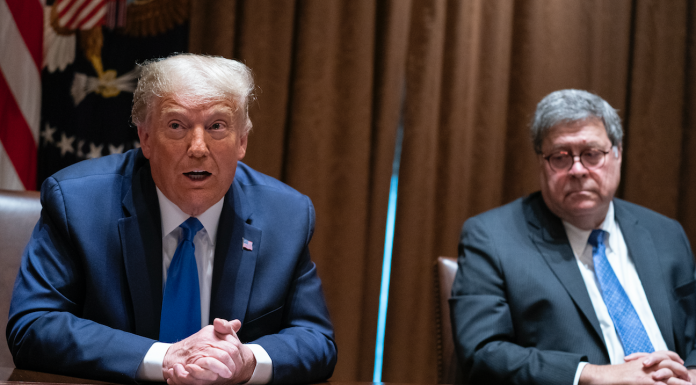Former attorney general William Barr offered new insight into his frayed relationship with former president Donald Trump, reiterating his past claim that skepticism of the election outcome was “all bulls**t” for a forthcoming book about the waning days of Trump’s first term.
In the months leading up to last year’s Nov. 3 election—as Trump mustered the energy to barnstorm the country at campaign rallies while simultaneously dealing with several unprecedented, Democrat-engineered national crises—billionaire-funded activist groups and corrupt, partisan officials took total control of local election offices.
However, Barr—one of the Trump administration’s last lines of defense in challenging the deluge of election violations enacted under the auspices of the coronavirus, as well as more blatant forms of vote fraud—acknowledged that his heart wasn’t in it, even as he went through the motions of appearing to investigate at the president’s behest.
“If there was evidence of fraud, I had no motive to suppress it,” Barr told ABC News correspondent Jonathan Karl.
“But my suspicion all the way along was that there was nothing there,” he added. “It was all bulls**t.”
Karl’s full book is due to be released in mid-November. But already, the preview, published Sunday in the far-left Atlantic, has ripped open the six-month-old wounds, prompting a harsh response from Trump.
It appears that @jonkarl’s reporting has upset the former president. pic.twitter.com/rBAsWFfo05
— Andrew Feinberg (@AndrewFeinberg) June 28, 2021
“It’s people in authority like Bill Barr that allow the crazed Radical Left to succeed,” Trump said in a statement issued late Sunday.
“He and other RINOs in the Republican Party are being used in order to try to convince people that the election was legitimate when so many incredible facts have now come out to show conclusively that it wasn’t,” Trump added.
Although filtered through the biases and dog-whistles of the dishonest mainstream media, Karl’s reporting helps, at the very least, to shed light on the mindset of Barr and others who went from being among Trump’s most trusted allies to his most notorious traitors after failing to prevent the cabal of leftist forces from delivering the election to Democrat Joe Biden through dubious means.
Upon realizing that Democrats were better organized, better financed and would stop at nothing to oust Trump, establishment Republicans—including then-Senate Majority Leader Mitch McConnell, R-Ky.—predictably turned eyes toward their own self-preservation.
McConnell pressured Barr to urge Trump to accept the disputed outcome, thereby allowing Republicans to focus on fearmongering over the impending Biden presidency in Georgia, where two Senate runoffs would determine the congressional majority.
“Bill, I look around, and you are the only person who can do it,” McConnell told the attorney general.
As Trump—still a political outsider, despite his four years in the White House—was counting on the nation’s top justice institutions to work in overdrive, he was met with a mix of deep-state passive-aggression, defeatism, and bad advice.
In stark contrast with the Biden administration—which quickly dispatched its top lawman, Attorney General Merrick Garland, to wage political attacks against states seeking to conduct audits and close loopholes in their voting laws—Barr seemed to take a more hands-off, laissez-faire approach.
Trump’s earlier public criticisms of Barr—for having kept hidden a Justice Department investigation of Hunter Biden and for Barr’s failure to push special counsel John Durham to conclude his probe of the FBI’s Russia collusion hoax—already had strained the relationship, much as was the case with Barr’s predecessor, Jeff Sessions.
As for vote fraud, Barr undertook “his own, unofficial inquiry into the major claims that the president and his allies were making.”
However, he had made up his own mind well in advance.
“Barr told me he had already concluded that it was highly unlikely that evidence existed that would tip the scales in the election,” Karl wrote.
“He had expected Trump to lose and therefore was not surprised by the outcome,” Karl continued. “He also knew that at some point, Trump was going to confront him about the allegations, and he wanted to be able to say that he had looked into them and that they were unfounded.”
During an inevitably heated Oval Office meeting, Barr instead deflected blame onto Trump’s campaign lawyers for failing to pursue the necessary legal avenues.
“You know, you only have five weeks, Mr. President, after an election to make legal challenges,” Barr said.
“This would have taken a crackerjack team with a really coherent and disciplined strategy,” he continued. “Instead, you have a clown show. No self-respecting lawyer is going anywhere near it. It’s just a joke. That’s why you are where you are.”
Barr’s refrain, however, was never that vote fraud hadn’t transpired, only that the Justice Department had failed to uncover sufficient evidence of it—which may have been from lack of trying.
“To date, we have not seen fraud on a scale that could have effected a different outcome in the election,” Barr told an Associated Press reporter in a Dec. 1 luncheon meeting where he first undermined Trump’s allegations.
Weeks later, in his eventual resignation letter to Trump, Barr conceded that the righteous effort to prevent the fraud had failed because they “had been met by a partisan onslaught against you in which no tactic, no matter how abusive and deceitful, was out of bounds.”
In retrospect, much of the failure seems to have stemmed from Trump’s inability to surround himself with those who were both loyal and competent—be it his lawyers, campaign advisers, or the government officials he entrusted to use their positions to rein in the systemic abuses of his political adversaries.
Trump capped off his statement on Sunday by saying that “Bill Barr was a disappointment in every sense of the word … [whose] weakness helped facilitate the cover up of the Crime of the Century, the Rigged 2020 Presidential Election!”

